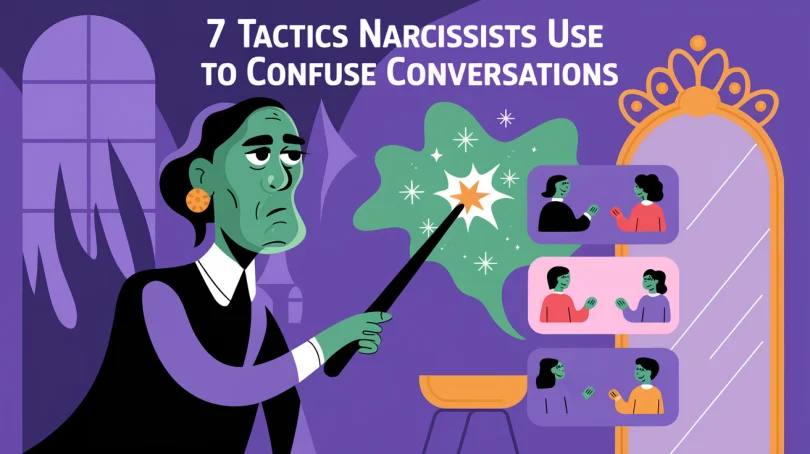Have you ever walked into a conversation with a narcissist and walked out feeling completely disoriented, and dizzy, as if you had just been caught in a whirlwind? You try to start a normal conversation, only to find yourself sucked into a never-ending loop of vague statements, meaningless topics, and absurd accusations. Don’t worry; you’re not alone.
Narcissists use sophisticated manipulation tactics to control and confuse conversations. They are masters of language, capable of twisting situations, distorting reality, and making you lose your way in your thoughts. You believe you’re having a normal discussion, but in reality, you’re being led astray, pulled into a vortex of confusion and disorientation.
Today, we’re pulling back the curtain to uncover seven one-of-a-kind tactics narcissists use to turn conversations into a dangerous psychological game. Get ready and join us on this thrilling journey. You’ll uncover the terrifying secrets hidden beneath the narcissist’s perfect mask.
1. They interrupt you.
For a narcissist, every conversation is like a grand stage play, and they must be the star. In their world, all the spotlight should be on them, and if you dare to steal the show, they will quickly find a way to reclaim the attention. What you say, feel, or share holds little significance because when you take control of the conversation, that bright spotlight no longer shines on them. And in their eyes, that is simply unacceptable.
To regain control, they won’t hesitate to interrupt you. You could be in the middle of telling a meaningful story or expressing an important personal opinion, only for them to cut in with a sudden question, an unrelated comment, or even a story entirely about themselves. They skillfully steer the conversation away, pulling you out of your safe zone the place where you feel heard and respected.
But they don’t stop there. They turn conversations into a game with rules that only they understand. If you make sharp points or present a compelling argument, they will deliberately derail the discussion, throwing vague questions, changing the subject, or leading you down a confusing path.
This isn’t just a way to maintain control; it’s a tactic designed to make you feel small, insignificant, and easily overpowered in the dialogue. And when they can’t win by arguing, they resort to dramatic theatrics. They might yawn loudly, show obvious boredom, or glance at their watch, as if to silently say, “I don’t have the patience to listen to you.” Every small action serves as a subtle message: “I am the one who deserves attention, not you.”
2. They raise their voice intentionally.
Narcissists have a unique ability to turn volume into a powerful psychological weapon. They don’t just use words to manipulate; they also know how to adjust their tone and volume to dominate and control the conversation. A sudden outburst, piercing shouts, or an overwhelmingly loud voice can leave you feeling stunned, off balance, and unsure of how to respond.
This behavior often emerges when they feel challenged or need to assert dominance. In such moments, raising their voice is not just an emotional reaction; it’s a calculated strategy to intimidate you, making you feel small, weak, and overpowered. When their voice becomes a tidal wave of noise, you may feel as if you’re being swept away, losing your ability to think clearly, and ultimately forced to give in just to de-escalate the situation.
What makes this tactic even more effective is its impact in public settings. In these environments, you’re not only dealing with their aggression but also the weight of social pressure the eyes and judgment of those around you. You fear being embarrassed, becoming the center of unwanted attention, or being perceived as the cause of the conflict. Narcissists know this and exploit it to the fullest.
5 Weird Texting Habits Of Narcissists
They trap you in a lose-lose situation: either you submit to end the scene quickly, or you stand your ground and endure the awkward stares of bystanders. Even worse, they might use public outbursts as a way to make you feel ashamed or guilty, even when you’ve done nothing wrong. Loud accusations, baseless claims, and their overwhelming volume work together to make you second-guess yourself.
Before you know it, you find yourself apologizing not because you were actually at fault, but just to make the chaos stop. This is one of the most insidious forms of manipulation. From being in the right, you are tricked into believing you are wrong, taking responsibility for the very disorder they created.
3. They use the word salad.
Word salad is not just a manipulation tactic; it’s a mental maze that narcissists construct to confuse, exhaust, and control you. They skillfully mix disjointed statements, unrelated information, and random topics, creating a tangled mess of words that leaves you completely bewildered.
This technique doesn’t just serve as a distraction; it allows them to hide their behavior and maintain dominance in the conversation. Imagine you start a discussion with a clear goal maybe you want to resolve an issue or get a straightforward explanation. The moment you ask a direct question, they launch into a long-winded, convoluted response that provides zero real answers.
They constantly switch topics, throw in vague examples, or even start telling completely unrelated stories. Every sentence seems carefully crafted not to clarify but to confuse, as if you were trying to assemble a puzzle where none of the pieces fit.
4 Ways to Torture The Narcissist
As a rational person, you don’t want to give up easily. You keep trying to make sense of their words, believing that if you just listen hard enough, you’ll uncover the hidden meaning. But the harder you try, the deeper you sink into their verbal maze. They may use complex phrasing, circular reasoning, or abstract ideas that make you question your understanding.
In the end, you realize you’ve completely lost focus on the original issue. Instead of finding clarity or resolution, you’ve been pulled into new, irrelevant discussions ones that are just chaotic enough to make you forget why the conversation even started. And that’s exactly what they want: to derail you, keep control, and escape accountability for their actions.
4. They manipulate you with gaslighting.
Gaslighting isn’t just a psychological manipulation tactic; it’s a deceptive mind game, a form of mental illusion that narcissists use to control and dominate you. By twisting reality and distorting the truth, they plant seeds of doubt in your mind, making you second-guess what you saw, heard, or even felt. Narcissists will flat-out deny things they’ve said or done, even if you have proof.
They might even go as far as to accuse you of saying or doing things you never did. With a mix of calculated words and eerily logical arguments, they make you start questioning yourself: “Did I misremember? Maybe I did say that.” These aren’t just fleeting doubts; they are warning signs that you are being pulled into their psychological trap.
At first, you may think it’s just a simple misunderstanding. But over time, as these mind games repeat again and again, you gradually lose trust in your judgment. You feel confused, and anxious, and start blaming yourself for mistakes you’re not even sure you made. The narcissist wins when you start believing that you are the problem, not them.
While you’re caught up replaying past conversations, trying to recall every detail to prove your reality, they’ve already accomplished their true goal: to distract you from the real issue. Instead of holding them accountable for their behavior, you become wrapped up in self-doubt, trying to make sense of a reality they’ve completely rewritten. They shift the focus away from their wrongdoing and onto your perception, making you feel like the one at fault.
5. They play the victim.
Playing the victim is not just a common tactic; it is a sophisticated art of manipulation that narcissists continuously refine and execute with masterful skill. They are experts at twisting situations, transforming every circumstance into a narrative where they are the helpless, misunderstood figure deserving of protection and sympathy. No matter how big or small the situation, anything can become a stage for their dramatic performance.
Imagine you simply asking them for a small favor, like washing the dishes or picking up the kids. For most people, this would be a normal request in daily life. But for a narcissist, it instantly becomes an opportunity for a full-blown performance. They complain about the unfairness of it all, exaggerate the immense burdens they already carry, and make sure to emphasize how inconsiderate you are for not recognizing their struggles. Phrases like, “I’m already exhausted; why can’t you just do it yourself?” or “Do you have any idea how much I’ve sacrificed for you?” are their go-to lines in this act.
This pattern doesn’t just stay within personal relationships; it extends to their social environment as well. They skillfully spin the story to others, painting themselves as deeply emotional and suffering individuals, making sure people see them as genuine victims. To outsiders, they appear to be self-sacrificing, silently enduring injustice, while you are cast as the selfish, heartless one or worse, an abuser. As a result, they gain attention, comfort, and support from those around them, while you become isolated and judged.
6. They turn themselves into a brilliant scholar.
Narcissists, driven by an intense desire to be in the spotlight and assert their intellectual superiority, often transform ordinary conversations into a stage where they can showcase their so-called profound knowledge. They don’t just want to be the center of attention; they crave admiration from you and those around you.
By leading you into an elaborate intellectual feast filled with complex theories and technical jargon, they overwhelm you, making you feel as if you’re standing before a true scholar. In these conversations, they confidently pass judgment, offer strong opinions, and never hesitate to educate you, as if they are masters of every subject. Even if you are an expert in the field, they skillfully overshadow your voice with bold declarations, sometimes even imposing their views upon you.
However, if you take a closer look, you’ll realize that their so-called knowledge is often superficial just deep enough to make a strong first impression. It’s not genuine understanding but rather a flashy facade they construct to mask their insecurities and lack of confidence.
A narcissist’s goal is not to share knowledge or enhance awareness but to make you feel small, inadequate, and increasingly dependent on them. They deliberately use complex terminology and convoluted explanations to make you doubt your understanding, subtly pushing you into the role of a student, completely overshadowed by their expertise.
Additionally, this tactic serves as a powerful distraction. Instead of focusing on the main topic of discussion, you get lost in the intellectual maze they create. They steer the conversation in a way that benefits them most, making you forget why you even asked a question or initiated the discussion in the first place. Over time, this erodes your confidence in your abilities, making you feel as though you need them to grasp the bigger picture.
A narcissist doesn’t just want to impress you; they want to pull you deeper into the illusionary world they construct. In that world, they are always superior the one with all the answers while you remain a follower, dependent on their supposed wisdom. This not only chips away at your self-esteem but also distorts your ability to see yourself and your worth.
7. They flaunt their morality.
Narcissists, with their masterful acting skills, often use the guise of morality as a powerful tool to manipulate, confuse, and dominate conversations. They wear the mask of a flawless individual, speaking in a sweet and polished manner, displaying refined gestures, and carefully curating their appearance.
These behaviors not only help them create a lasting impression but also make you feel small, unrefined, and even not good enough to stand on equal footing with them. They often present themselves as deeply knowledgeable in all matters of ethics, morality, and even complex social issues.
In every conversation, they are ready to offer profound and righteous viewpoints, making it easy for you to believe that they possess superior wisdom. But instead of sharing insights to foster mutual understanding, they wield these topics as weapons of manipulation, reinforcing their self-proclaimed superiority.
Beyond just showing off, they take it upon themselves to educate you on how to live, how to think, and even how to behave. They pass judgment on your choices—from trivial matters like your clothing and speech to major life decisions. But their goal is not to help you grow or improve; it is to make you feel inadequate and increasingly dependent on them.
The more you doubt your worth, the easier it becomes for them to seize control, pulling you deeper into their cycle of manipulation. This moral performer persona they construct is nothing more than a glossy facade one that hides an underlying truth that few recognize: a fragile, insecure ego that desperately craves admiration. They are not genuinely seeking truth or righteousness; they are merely using these concepts as tools to solidify their dominance.
The perfection they display is just a mask designed to attract attention, gain admiration, and ultimately control those around them.
A conversation with a narcissist is often not just an exchange of information but a battlefield where they deploy a range of sophisticated tactics to manipulate, control, and confuse you. From diverting the topic, using word salad, and emotionally distracting you, to asserting intellectual superiority or playing the victim, each tactic is designed to disorient you, make you doubt yourself, and ultimately submit to their control. These tactics not only erode your trust and confidence but also create a negative spiral that makes you feel like you’re always wrong and constantly unstable.
The key is to recognize these signs and stand your ground in the conversation. Don’t get lost in the web of confusion they weave. Stay focused on your original intent, trust your intuition, and refuse to let them manipulate your emotions. Remember, narcissists may be highly skilled at creating chaos, but true power lies in maintaining your calm and clarity. Once you understand these tactics, you not only protect yourself from manipulation but also build strong boundaries to safeguard your values and self-worth. A conversation is not a place for them to seize control; it is a space where you deserve to be respected and heard.






